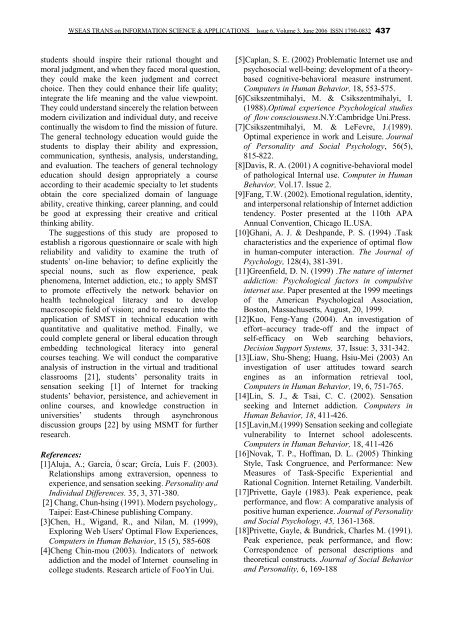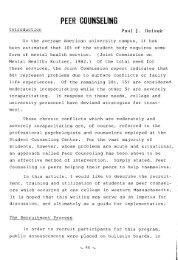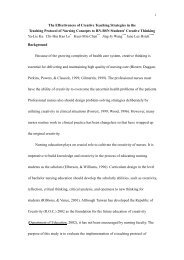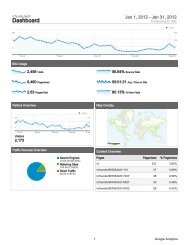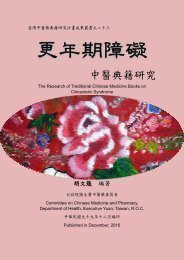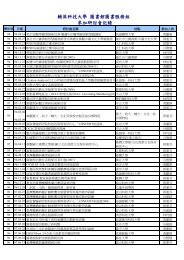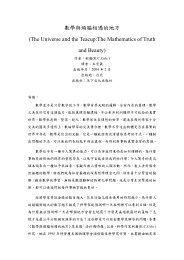Title of the Paper (18pt Times New Roman, Bold)
Title of the Paper (18pt Times New Roman, Bold)
Title of the Paper (18pt Times New Roman, Bold)
You also want an ePaper? Increase the reach of your titles
YUMPU automatically turns print PDFs into web optimized ePapers that Google loves.
WSEAS TRANS on INFORMATION SCIENCE & APPLICATIONS Issue 6, Volume 3, June 2006 ISSN 1790-0832 437<br />
students should inspire <strong>the</strong>ir rational thought and<br />
moral judgment, and when <strong>the</strong>y faced moral question,<br />
<strong>the</strong>y could make <strong>the</strong> keen judgment and correct<br />
choice. Then <strong>the</strong>y could enhance <strong>the</strong>ir life quality;<br />
integrate <strong>the</strong> life meaning and <strong>the</strong> value viewpoint.<br />
They could understand sincerely <strong>the</strong> relation between<br />
modern civilization and individual duty, and receive<br />
continually <strong>the</strong> wisdom to find <strong>the</strong> mission <strong>of</strong> future.<br />
The general technology education would guide <strong>the</strong><br />
students to display <strong>the</strong>ir ability and expression,<br />
communication, syn<strong>the</strong>sis, analysis, understanding,<br />
and evaluation. The teachers <strong>of</strong> general technology<br />
education should design appropriately a course<br />
according to <strong>the</strong>ir academic specialty to let students<br />
obtain <strong>the</strong> core specialized domain <strong>of</strong> language<br />
ability, creative thinking, career planning, and could<br />
be good at expressing <strong>the</strong>ir creative and critical<br />
thinking ability.<br />
The suggestions <strong>of</strong> this study are proposed to<br />
establish a rigorous questionnaire or scale with high<br />
reliability and validity to examine <strong>the</strong> truth <strong>of</strong><br />
students’ on-line behavior; to define explicitly <strong>the</strong><br />
special nouns, such as flow experience, peak<br />
phenomena, Internet addiction, etc.; to apply SMST<br />
to promote effectively <strong>the</strong> network behavior on<br />
health technological literacy and to develop<br />
macroscopic field <strong>of</strong> vision; and to research into <strong>the</strong><br />
application <strong>of</strong> SMST in technical education with<br />
quantitative and qualitative method. Finally, we<br />
could complete general or liberal education through<br />
embedding technological literacy into general<br />
courses teaching. We will conduct <strong>the</strong> comparative<br />
analysis <strong>of</strong> instruction in <strong>the</strong> virtual and traditional<br />
classrooms [21], students’ personality traits in<br />
sensation seeking [1] <strong>of</strong> Internet for tracking<br />
students’ behavior, persistence, and achievement in<br />
online courses, and knowledge construction in<br />
universities’ students through asynchronous<br />
discussion groups [22] by using MSMT for fur<strong>the</strong>r<br />
research.<br />
References:<br />
[1]Aluja, A.; García, Ó scar; Grcía, Luís F. (2003).<br />
Relationships among extraversion, openness to<br />
experience, and sensation seeking. Personality and<br />
Individual Differences. 35, 3, 371-380.<br />
[2] Chang, Chun-hsing (1991). Modern psychology,.<br />
Taipei: East-Chinese publishing Company.<br />
[3]Chen, H., Wigand, R., and Nilan, M. (1999),<br />
Exploring Web Users' Optimal Flow Experiences,<br />
Computers in Human Behavior, 15 (5), 585-608<br />
[4]Cheng Chin-mou (2003). Indicators <strong>of</strong> network<br />
addiction and <strong>the</strong> model <strong>of</strong> Internet counseling in<br />
college students. Research article <strong>of</strong> FooYin Uui.<br />
[5]Caplan, S. E. (2002) Problematic Internet use and<br />
psychosocial well-being: development <strong>of</strong> a <strong>the</strong>orybased<br />
cognitive-behavioral measure instrument.<br />
Computers in Human Behavior, 18, 553-575.<br />
[6]Csikszentmihalyi, M. & Csikszentmihalyi, I.<br />
(1988).Optimal experience Psychological studies<br />
<strong>of</strong> flow consciousness.N.Y:Cambridge Uni.Press.<br />
[7]Csikszentmihalyi, M. & LeFevre, J.(1989).<br />
Optimal experience in work and Leisure. Journal<br />
<strong>of</strong> Personality and Social Psychology, 56(5),<br />
815-822.<br />
[8]Davis, R. A. (2001) A cognitive-behavioral model<br />
<strong>of</strong> pathological Internal use. Computer in Human<br />
Behavior, Vol.17. Issue 2.<br />
[9]Fang, T.W. (2002). Emotional regulation, identity,<br />
and interpersonal relationship <strong>of</strong> Internet addiction<br />
tendency. Poster presented at <strong>the</strong> 110th APA<br />
Annual Convention, Chicago IL.USA.<br />
[10]Ghani, A. J. & Deshpande, P. S. (1994) .Task<br />
characteristics and <strong>the</strong> experience <strong>of</strong> optimal flow<br />
in human-computer interaction. The Journal <strong>of</strong><br />
Psychology, 128(4), 381-391.<br />
[11]Greenfield, D. N. (1999) .The nature <strong>of</strong> internet<br />
addiction: Psychological factors in compulsive<br />
internet use. <strong>Paper</strong> presented at <strong>the</strong> 1999 meetings<br />
<strong>of</strong> <strong>the</strong> American Psychological Association,<br />
Boston, Massachusetts, August, 20, 1999.<br />
[12]Kuo, Feng-Yang (2004). An investigation <strong>of</strong><br />
effort–accuracy trade-<strong>of</strong>f and <strong>the</strong> impact <strong>of</strong><br />
self-efficacy on Web searching behaviors,<br />
Decision Support Systems, 37, Issue: 3, 331-342.<br />
[13]Liaw, Shu-Sheng; Huang, Hsiu-Mei (2003) An<br />
investigation <strong>of</strong> user attitudes toward search<br />
engines as an information retrieval tool,<br />
Computers in Human Behavior, 19, 6, 751-765.<br />
[14]Lin, S. J., & Tsai, C. C. (2002). Sensation<br />
seeking and Internet addiction. Computers in<br />
Human Behavior, 18, 411-426.<br />
[15]Lavin,M.(1999) Sensation seeking and collegiate<br />
vulnerability to Internet school adolescents.<br />
Computers in Human Behavior, 18, 411-426<br />
[16]Novak, T. P., H<strong>of</strong>fman, D. L. (2005) Thinking<br />
Style, Task Congruence, and Performance: <strong>New</strong><br />
Measures <strong>of</strong> Task-Specific Experiential and<br />
Rational Cognition. Internet Retailing. Vanderbilt.<br />
[17]Privette, Gayle (1983). Peak experience, peak<br />
performance, and flow: A comparative analysis <strong>of</strong><br />
positive human experience. Journal <strong>of</strong> Personality<br />
and Social Psychology, 45, 1361-1368.<br />
[18]Privette, Gayle, & Bundrick, Charles M. (1991).<br />
Peak experience, peak performance, and flow:<br />
Correspondence <strong>of</strong> personal descriptions and<br />
<strong>the</strong>oretical constructs. Journal <strong>of</strong> Social Behavior<br />
and Personality, 6, 169-188


